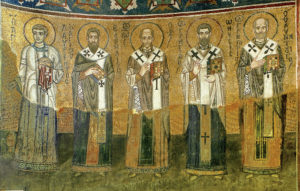 In December 2006, I was given the honor and the horror of being selected to “roast” Dr. Michael Weed at the faculty-student Christmas party at Austin Graduate School of Theology. The five minute bit was part of a video we students made as the main entertainment for the evening. I played Dr. Weed giving a lecture on New Testament theology to a class of a dozen or so diligent note-takers. And I played up every one of Dr. Weed’s idiosyncrasies and habits.
In December 2006, I was given the honor and the horror of being selected to “roast” Dr. Michael Weed at the faculty-student Christmas party at Austin Graduate School of Theology. The five minute bit was part of a video we students made as the main entertainment for the evening. I played Dr. Weed giving a lecture on New Testament theology to a class of a dozen or so diligent note-takers. And I played up every one of Dr. Weed’s idiosyncrasies and habits.
I exaggerated the way Dr. Weed dug into both eyes with the heels of his hands as he tried to remember a name or a date from the Middle Ages. I overdid the way he rubbed his forehead with all ten fingers as he contemplated the answer to a student’s question that had nothing to do with the topic at hand. I made fun of how Dr. Weed would talk randomly about seemingly unrelated events from different continents and centuries and then connect them all together to drive home his point that you didn’t even know he was making.
I quoted a lot of his well-worn lines like, “I’m old enough to say this book was written five years ago and it was really thirty” and “I wanna say this carefully…” and “I don’t want this to sound pejorative” and “I’ll give you a chance to push back on that in a minute.”
At one point in the video I mimicked Dr. Weed’s breakneck lecturing pace. We showed closeups of students doing their best to keep up. One student’s desk was littered with nubs of pencils he’d gone through. We used matches and slow motion to make it look like one student’s pen was literally catching on fire as she tried to keep up. I said one of Dr. Weed’s most used lines: “Am I going too fast? I’ll slow down.” And then I started talking even faster.
“Think with me…”
“We can do ethics in theology. Or are we doing theology in history? What class is this?”
“Fair enough?”
“Oh, Bernice!”
I ended the video with the way Dr. Weed always ended every single one of his lectures. “Peace.”
Later in the evening, Dr. Weed began his encouragement to the students by pointing out to everyone how foolish it was of me to put that performance on video the week before finals.
Those two years at Austin Grad were a formative time for me and Dr. Weed was at the very front and center of it all. I was reading the Bible for the first time as a narrative, as the Story of our God and his people, instead of a verse here and a verse there pulled out of context to support an argument. Scriptural dots were being connected. My faith in the Lord and his salvation mission was becoming more important than my strict adherence to a set of rules. I was appreciating Church history for the very first time in my life. I was understanding for the first time that tradition is the living faith of the dead and traditionalism is the dead faith of the living. He introduced me to Karl Barth and Augustine, Reinhold Niebuhr and Neil Postman, Bonhoeffer and Erasmus. He taught me about the sacral framework of our communities and churches. He showed me how we are being formed all the time by everything around us; nothing is neutral, everything is created or made for a purpose; form is function; the medium is the message. He personally worked with me through some of my early issues with what he called “theological puberty.” In my second year at Austin Grad I made sure I spent at least one afternoon per week in his office talking about theology and ministry, the current state and the coming future of our congregation in Marble Falls and the Church in America as a whole.
During my first seven or eight years preaching, a month did not go by that I didn’t consult my old Austin Grad notebooks to find a quote or an illustration from Dr. Weed that would help me in a sermon. The exact analogy. The perfect example. Dr. Weed made nearly half of my early sermons tolerable instead of torture.
After every lecture, Dr. Weed would stop and say, “Now, here’s how the Church needs to hear this. Here’s why this matters.” And it would get really practical really fast. Here’s what’s happening to Christians, this is what they are hearing and believing and doing, and here’s where the Scriptures can better form us. Here’s where the history can inform us. Here’s how our faith can transform us. When I returned to Austin Grad for a sermon seminar he would always ask me, “Allan, how are your people being formed?” It was always top-notch world-class scholarship with Dr. Weed. But it was always for the Church.
Dr. Weed finished his race on Saturday. He ran well. Very well. He died in Austin, loved by our God, forgiven by Christ Jesus, and filled to overflowing by the Holy Spirit of our Lord.
The tributes and memorials will be many over the next few days. Here’s a link to a beautiful piece authored by Todd Hall. Even if you’ve never heard of Michael Weed, this tribute by Todd is worth the read. Todd shares a letter Dr. Weed wrote to him after Todd’s wife died in 2000, a wonderful portrait of a teacher who genuinely loves his Lord and loves his students.
Dr. Weed is a renowned Christian scholar, a prolific writer, and a beloved teacher. His impact on preachers and churches and the Kingdom of God can never truly be measured. I am just one of his thousands of students. He was my teacher. So influential. I admire him and his thinking and his faith so much. My careful attention to Christian formation is a gift from Dr. Weed to me and to the churches where I’ve preached. Transformation and mission. Formation zones. Christian practices and spiritual disciplines. Ecumenical partnerships. 4Amarillo and 4Midland. All of that grows from seeds Dr. Weed planted in me and nurtured by faith during those crucial two years at Austin Grad.
I use the word “pejorative” because of Dr. Weed. I’m extra sensitive to the damaging effect of digital technologies because of Dr. Weed. And I sign every blog and every bulletin article and every letter and card with “Peace” because of Dr. Weed.
I thank God today for Dr. Weed. I praise God that he placed Dr. Weed right in front of me when I first started hungering and thirsting for a closer relationship with the Lord and growing in my desire to answer God’s calling to congregational ministry. May our heavenly Father bless all those who are grieving today. May we all be comforted by the many memories of how Dr. Weed impacted us, our ministries, and our faith. And may our Lord receive Dr. Weed into his loving and faithful arms on that great day of eternal resurrection that is coming very soon.
Peace.
Allan








Recent Comments